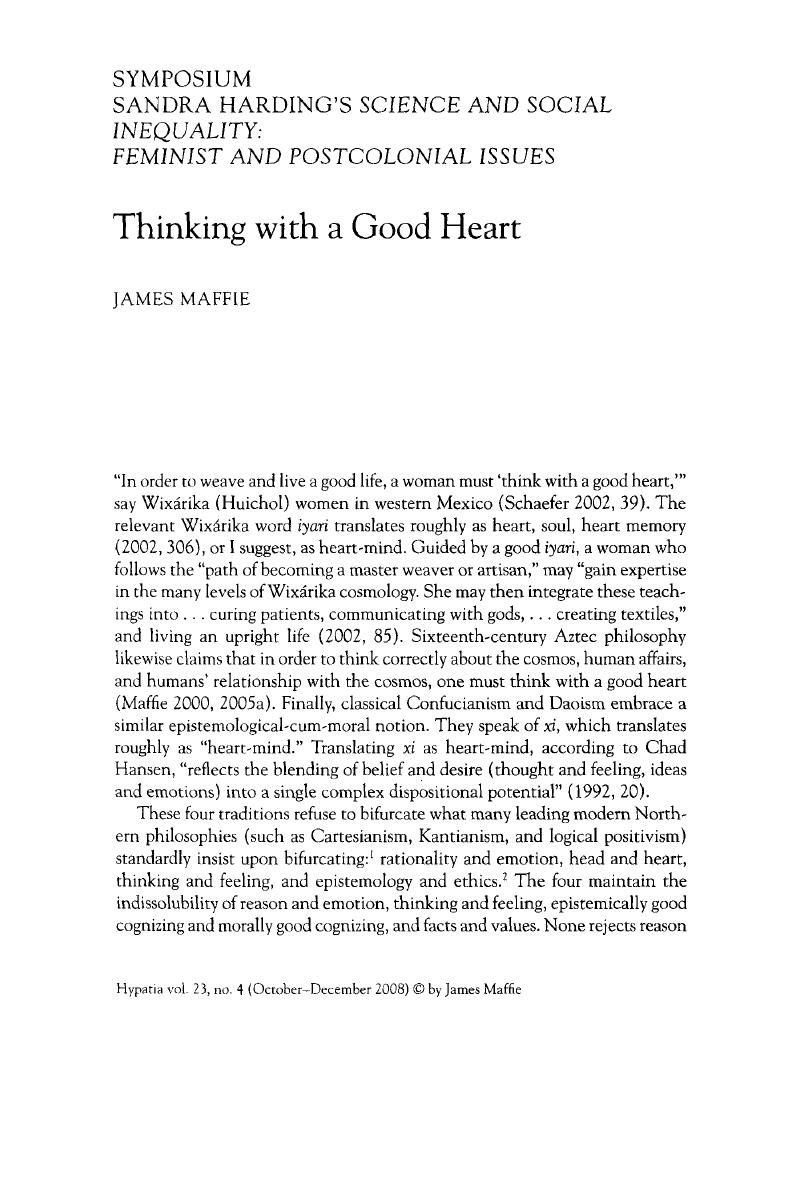No CrossRef data available.
Article contents
Thinking with a Good Heart
Published online by Cambridge University Press: 11 March 2020
Abstract
An abstract is not available for this content so a preview has been provided. Please use the Get access link above for information on how to access this content.

- Type
- Symposium Sandra Harding's Science and Social Inequality: Feminist and Postcolonial Issues
- Information
- Copyright
- Copyright © 2008 by Hypatia, Inc.
References
Aikenhead, Glen S. 1997. Toward a First Nations cross‐cultural science and technology curriculum. Science Education 81: 217–38.3.0.CO;2-I>CrossRefGoogle Scholar
Hansen, Chad. 1992. A Daoist theory of Chinese thought. Oxford: Oxford University Press.Google Scholar
Deloria, Barbara, Foehner, Kristen, and Scinta, Sam, eds. 1999. Spirit and reason: A Vine Deloria, Jr., reader. Golden, Colo.: Fulcrum Publishers.Google Scholar
Deloria, Vine Jr., and Wildcat, Daniel R. 2001. Power and place. Golden, Colo.: American Indian Graduate Center and Fulcrum Resources.Google Scholar
Goleman, Daniel. 1991. Tibetan and Western models of mental health. In Mind science: An East‐West dialogue, ed. Goleman, Daniel and Thurman, Robert. Boston: Wisdom Publications.Google Scholar
Goonatilake, Susantha. 1998. Toward a global science. Bloomington: Indiana University Press.Google Scholar
Harding, Sandra. 1998. Is science multicultural?Postcolonialisms, feminisms, and epistemologies. Bloomington: Indiana University Press.Google Scholar
Harding, Sandra. 2006. Science and social inequality: Feminist and postcolonial issues. Urbana: University of Illinois Press.Google Scholar
Hess, David. 1995. Science and technology in a multicultural world. New York: Columbia University Press.CrossRefGoogle Scholar
Hickman, Larry A., and Alexander, Thomas M., eds. 1998. The essential John Dewey, Vols. 1 and 2. Bloomington: Indiana University Press.Google Scholar
Jaggar, Alison M. 1989. Love and knowledge: Emotion in feminist epistemology. In Gender/Body/Knowledge: Feminist reconstructions of being and knowing, ed. Jaggar, Alison M. and Bordo, Susan R.New Brunswick, N.J.: Rutgers University Press.Google Scholar
Lloyd, Genevieve. 1984. The man of reason: “Male” and “female” in Western philosophy. Minneapolis: University of Minnesota Press.Google Scholar
Maffie, James. 2000. ‘Like a painting we will be erased, like a flower, we will dry up here on earth”: Ultimate reality and meaning according to Nahua thought in the era of the conquest. Ultimate Reality and Meaning: Interdisciplinary Studies in the Philosophy of Understanding 23: 295–318.CrossRefGoogle Scholar
Maffie, James. 2005a. Aztec philosophy. The internet encyclopedia of philosophy. http://www.iep.utm.edu/a/aztec.htm.Google Scholar
Maffie, James. 2005b. Ethnoepistemology. The internet encyclopedia of philosophy. http://www.iep.utm.edu/e/ethno‐ep.htm.Google Scholar
Maffie, James. 2008. ‘Whatever happens, we have the Gatling gun, and they have not”: Future prospects for indigenous knowledges. Futures: The Journal of Policy, Planning, and Futures Studies.Google Scholar
Railton, Peter. 1991. Marx and the objectivity of science. In The philosophy of science, ed. Boyd, Richard, Gaspar, Philip, and Trout, J. D.Cambridge: MIT Press.Google Scholar
Rose, Hilary Rose 1994. Love, power, and knowledge: Towards a feminist transformation of the sciences. Bloomington: Indiana University Press.Google Scholar
Schaefer, Stacy B. 2002. To think with a good heart: Wixárika women, weavers, and shamans. Salt Lake City: University of Utah Press.Google Scholar
Shiva, Vandana. 1997. Biopiracy: The plunder of nature and knowledge. Boston: South End Press.Google Scholar
Simonelli, Richard. 1994. Sustainable science: A look at science through historic eyes and the eyes of indigenous peoples. Bulletin of Science, Technology, and Society 14: 1–12.CrossRefGoogle Scholar
Smith, Linda Tuhiwai 1999. Decolonizing methodologies: Research and indigenous practices. London: Zed Books.Google Scholar


